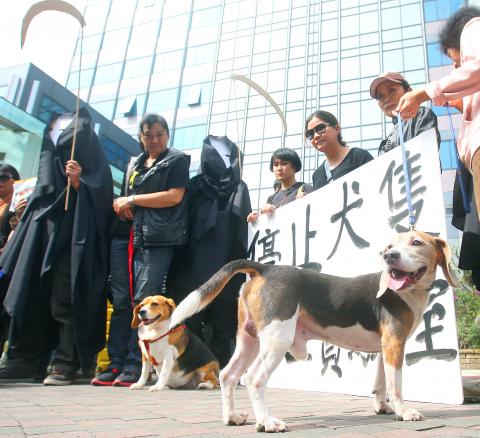Animal rights activists and pet lovers yesterday gathered in front of the Atomic Energy Council (AEC) to protest against the use of beagles in animal experiments.
The group was protesting against toxicity and safety tests for a new drug being developed by the council’s Institute of Nuclear Energy Research (INER) that are being carried out on beagles.
Holding up a banner reading “Protest against animal abuse! The AEC disregards life!” and accompanied by 10 beagles, the group of about 30 protesters urged the council to stop testing new drugs on animals.

Photo: CNA
Animal rights advocate Huang Tai-shan (黃泰山) said the council made a worldwide call for bids on the Internet earlier this month for 40 beagles to conduct drug tests.
The council is asking for beagles who have cancer, Huang said, adding that the council dissects some of the dogs on the second day after being injected with an experimental drug and that more are dissected on the 15th day of the testing.
“The lucky ones that survive the experiment are sent to other research centers for other experiments until they die,” he said.
The council denied asking for cancerous dogs, saying that the beagles imported are healthy dogs.
Wang Hsiao-hua (王小華), a member of the Kaohsiung Concern Stray Animal Association, said the beagles that were experimented on were just like any other pet beagle, and experienced fear and pain during the tests.
Many animal experiments to develop drugs have already proven ineffective, so the council should find alternative methods to test drugs, Huang said, adding that they were also strongly against the establishment of a dog radiotoxicological experiment lab at the council, as it would encourage more experiments on dogs.
The protest group submitted a petition to INER deputy director-general Shen Lie-hang (沈立漢), asking the council asking to stop the experiments on beagles.
Shen offered the group a report on the experiments they conducted inside the building.
“We don’t want to hear about the inhumane experiments, we want a clear answer from a higher authority. Life is nonnegotiable!” the protesters shouted, refusing to go inside the building for talks.
Following this, Atomic Energy Council Deputy Minister Chou Yuan-ching (周源卿) met with the protesters and agreed that the council would use official documents to inform the association of the council’s decision on the tests within two weeks.
Shen said the experiments were used to test the safety of a new drug being developed by the institute for treating colon and rectal cancer and that procedures had been carried out according to legal regulations.
Shen said that according to the Department of Health’s Guideline for the Nonclinical Pharmacology/Toxicology Studies for Medicinal Products, testing on rodents and non-rodents is necessary to ensure the safety of medicines on the human body and that the experiments should be monitored by the Institutional Animal Care and Use Committee.
Shen said the use of beagles as non-rodent experimental animals is common in many countries because of their stable gene structure
The council limited the number of dogs used to the fewest possible, Shen added.
According to Council of Agriculture statistics, about 1.52 million animals (including 291 dogs) were used in research experiments in 2009 and about 1.3 million (including 247 dogs) were used last year.

‘DENIAL DEFENSE’: The US would increase its military presence with uncrewed ships, and submarines, while boosting defense in the Indo-Pacific, a Pete Hegseth memo said The US is reorienting its military strategy to focus primarily on deterring a potential Chinese invasion of Taiwan, a memo signed by US Secretary of Defense Pete Hegseth showed. The memo also called on Taiwan to increase its defense spending. The document, known as the “Interim National Defense Strategic Guidance,” was distributed this month and detailed the national defense plans of US President Donald Trump’s administration, an article in the Washington Post said on Saturday. It outlines how the US can prepare for a potential war with China and defend itself from threats in the “near abroad,” including Greenland and the Panama

A wild live dugong was found in Taiwan for the first time in 88 years, after it was accidentally caught by a fisher’s net on Tuesday in Yilan County’s Fenniaolin (粉鳥林). This is the first sighting of the species in Taiwan since 1937, having already been considered “extinct” in the country and considered as “vulnerable” by the International Union for Conservation of Nature. A fisher surnamed Chen (陳) went to Fenniaolin to collect the fish in his netting, but instead caught a 3m long, 500kg dugong. The fisher released the animal back into the wild, not realizing it was an endangered species at

The High Prosecutors’ Office yesterday withdrew an appeal against the acquittal of a former bank manager 22 years after his death, marking Taiwan’s first instance of prosecutors rendering posthumous justice to a wrongfully convicted defendant. Chu Ching-en (諸慶恩) — formerly a manager at the Taipei branch of BNP Paribas — was in 1999 accused by Weng Mao-chung (翁茂鍾), then-president of Chia Her Industrial Co, of forging a request for a fixed deposit of US$10 million by I-Hwa Industrial Co, a subsidiary of Chia Her, which was used as collateral. Chu was ruled not guilty in the first trial, but was found guilty

The Chinese Nationalist Party (KMT) is maintaining close ties with Beijing, the Democratic Progressive Party (DPP) said yesterday, hours after a new round of Chinese military drills in the Taiwan Strait began. Political parties in a democracy have a responsibility to be loyal to the nation and defend its sovereignty, DPP spokesman Justin Wu (吳崢) told a news conference in Taipei. His comments came hours after Beijing announced via Chinese state media that the Chinese People’s Liberation Army’s Eastern Theater Command was holding large-scale drills simulating a multi-pronged attack on Taiwan. Contrary to the KMT’s claims that it is staunchly anti-communist, KMT Deputy